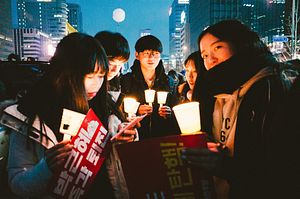Former South Korean President Park Geun-hye’s ignominious departure from office in March and subsequent corruption trial have been major embarrassments for South Korea’s democracy, but also a test of resilience that it appears to have passed. As newly-elected President Moon Jae-in finds his footing, international attention has moved on, at least until a verdict in the case against Park is reached. But rather than simply fading away as one more scene in an unfortunately rich Korean tapestry of presidential malfeasance, Park’s exit should be understood as a turning point with long-reaching implications for South Korean democracy — the political awakening of Korea’s youth.
It is a common complaint among political observers who remember the vigorous grassroots protest movements of the 1970s and 1980s that young Koreans of the current generation are politically apathetic. During visits to the country in the past several years, when I told Seoulites that I studied politics, they often said they didn’t follow the news and that they avoided talking about potentially divisive issues with their friends. Some still do. Especially eyebrow-raising, at least for foreigners, is the lack of interest in North Korea. A college graduate I met recently could not remember the name of its leader, a nuclear-armed dictator right next door who has threatened to turn her hometown into “a lake of fire.”
This lack of interest in politics has not been for lack of grievances. Frustration over socioeconomic problems like unemployment, the lack of housing, and inequality has spawned a creative and cutting vocabulary, like calling their country “Hell Chosun,” a reference to the Chosun Dynasty (1392-1897). But studies have documented the widespread feeling among youth that meaningful political change was impossible. Concerned commentators have over the last decade pushed for various proposals to bring young people in, including lowering the voting age, having younger legislative representatives, or even creating a political party specifically for the youth. None has had much success.
The first big crack in this trend appeared in 2014, just a few months after I first arrived in Seoul, with the widespread public venting of sorrow and anger in the wake of the sinking of the Sewol ferry and the Park administration’s fumbling response. Young people felt a strong connection to the high school-age victims. And many who had already been left-leaning and distrustful of Park’s authoritarian tendencies had their fears confirmed in her secretive handling of the rescue and strong-arm police tactics to quash protests. It is clear now that the Sewol tragedy and the government’s response to it primed the pump for the massive demonstrations that erupted in 2016, when Park’s web of sordid government-business collusion and special favors came to light.
For many young people these demonstrations were their first experience of mass grassroots political participation. They were fueled by righteous anger. “It was just too awful! It was everything I was upset about… Privilege. You know? Golden spoons and dirt spoons,” a 28-year-old Yonsei University graduate told me. (The spoons, in a now-popular expression, refer to privileged and underprivileged people.) Many were galled at how Ewha Womans University broke the rules to favor applicant Chung Yoo-ra, the daughter of Park Geun-hye’s close confidante Choi Soon-sil, while so many young Koreans are struggling to find jobs without prestigious college credentials. “The corruption was so bad,” a friend told me, shaking his head. He had never gone to a protest before, but he went for that. Others echoed his sentiments, though a few also admitted that the demonstrations had been fun “like a party” and that politics is now “more entertaining than an entertainment program.”
Crucially, young people have stayed engaged even after Park’s impeachment and the new election. Toppling a president with people power has changed the previously pervasive feeling that nothing can change in politics. Hopes are high for Moon all around, and for once many young people are watching closely. As a candidate he bemoaned that young people were uninterested in politics and promised to bring them in. He won the younger demographics handily and gave a shout-out in his inaugural address to the sacrifices young people make. For the first time in a presidential election, as various commentators have noted, the generational divide in voting was more prominent than the usual regional divides.
But will this new youth engagement last? It’s of course possible that the much-disliked Park was a unique figure and with her now gone young people will tune out from politics again. That scenario, however, seems unlikely. Mass youth demonstrations in 2014 in both Taiwan and Hong Kong, now called the Sunflower Movement and the Umbrella Movement, kicked youth engagement into high gear in a sustained way. In Romania, the persistence of youth-led anti-corruption protests has changed Romanian politics. While these cases are not the same as South Korea, they show that youth demonstrations driven by anger at bad government behavior, once triggered, lower the threshold for new protests. This logic is especially relevant to South Korea because the demonstrations removed Park but didn’t bring about any systemic change. The permissive conditions for high-level government-business collusion and corruption remain intact, to the frustration of many. That’s why it won’t take another Park Geun-hye — we can hope — to rally South Korea’s youth to meet the next challenge.
Chris Carothers is a PhD Candidate in Political Science and Ashford Fellow at Harvard University. His doctoral research focuses on the politics of corruption in East Asia and makes extensive use of Chinese and Korean-language sources.
































